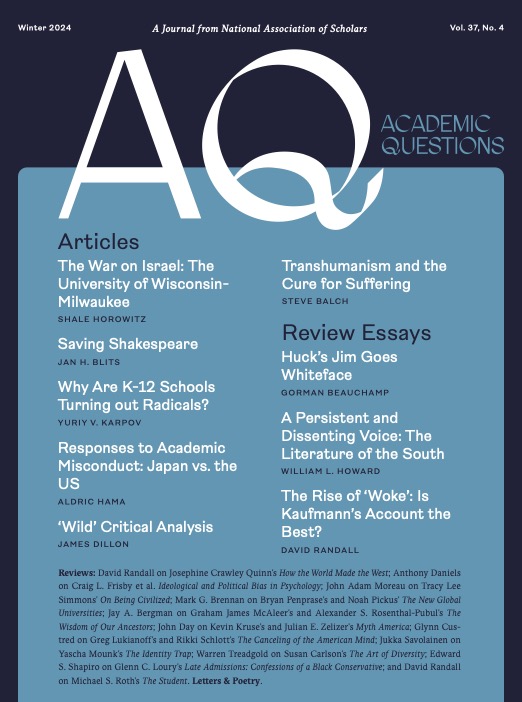On Being Civilized: A Few Lines Amid the Breakage, Tracy Lee Simmons, Memoria College Press, pp. 281, $15.45 softcover.
American classicist, military historian, and political pundit Victor Davis Hanson says the following of On Being Civilized:
Tracy Lee Simmons … has spent a lifetime writing … with one common theme: The legacy and values of Western culture in all its brilliant manifestations are critical to the continuation of our civilization and yet are eroding at an astonishing speed. In a renewed call to arms Simmons has collected more than fifty of his … insightful and beautifully crafted [writings] to remind us that, unless we stop the current collective suicide, destroying our past will surely destroy our future.
If Hanson were the only person who esteems him, that would be bankable for a lifetime. However, a little digging reveals how many others of accomplishment think Simmons hangs the moon. Simmons is a confident man of letters but there are no hints that he himself is impressed by Tracy Lee Simmons. He is serious in taking on the quicksilver task of trying to define what it is to be civilized. In brief, it is to seek the Good, the True, and the Beautiful in what one knows and believes and how one acts. Pope Benedict XVI was a civilized person and so was the novelist Storm Jameson. This is not a rarefied matter. My tennis doubles partner and my mailman are civilized persons too. When asked in an interview to name a present-day civilized person Simmons right away says Joseph Epstein.
The reader also finds that if Simmons is serious, he is also a fellow with a light sense of irony. In the opening chapter, “What Is Civilization?,” he says that if defining civilization can be too onerous we can at least recognize civilization when we see it. He follows with forty-eight entries on that score. Only the cranky would miss the mirth and accuracy of these statements.
Yet, this is not a facetious or slapdash book. Simmons is in careful earnest about what he believes is the dumpster fire of education at all levels, the divorce from the wisdom of the West, the embrace of victimhood, the far-flung recipes for “self-expression,” and the wreckage of written and spoken English. These things and others make for the breakage in the book’s subtitle. However, the reader does not find a caustic scolding. Instead, the reader is presented with erudite discussions that do not quite make for a May Day! May Day!
Simmons was the founding chair of the Dow Program in American Journalism at Hillsdale College. These days he lectures and conducts seminars widely and he is avidly involved with efforts to include Greek and Latin in homeschooling. A graduate in classics from Oxford University, Simmons also is the author of the well-received Climbing Parnassus: A New Apologia for Greek and Latin.
On Being Civilized has a foreword, an introduction, an epilogue, and the book’s writings are distributed in five sections: Biography, History, Language, Literature, and Culture. There is not a dull page and the reader feels he is looking over the shoulder of a master who thinks the reader will enjoy hearing about what interests him. The elegant writing is less faculty lounge schmoozing than it is “barman!-another-round!”
Simmons’ writing is part Mencken because he can bite (especially when writing of the lameness of English Ph.D.’s, the ruinous ideas of Dewey, Sartre, Freud, Spock). The writing is part Chesterton because Simmons has a silky skill at making a point (the civilized man has to have a spine, the shallow names of the 1960s e.g. Ginsberg, William Burroughs in uninteresting ways said nothing interesting). In sum, Simmons’ writing is brisk and vigorous. He never patronizes those who know less than he does. He likes classy words—for example quiddity (the inherent nature or essence of someone or something, a distinctive feature, a peculiarity). He uses few upscale words and when he does they fit where he puts them and they do not grate.
There is a large sector in society that is indifferent. Another sector believes our society is better off than ever because it has thrown off the bonds of the past, looks with inspired intelligence at the matters of the day, and has enriched our culture by welcoming countless ways of thinking and acting that differ worthily from the past. This sector believes most grave problems have solutions. This sector also believes the third sector is wedded to boneheaded self-satisfaction. Simmons is in the third sector, which believes most grave problems are conditions. This sector sees a crippling arrogance in the progressive presumptions about changing the world and men. This sector believes much is broken in our society and culture.
There are no specific marching orders. But there is throughout On Being Civilized the commonsense strain that to arrest the decay in American society and culture there must be a new grasping in teaching, shared beliefs and attitudes, and in behavior as to what made us until of late and what we had ere long been. It is not, in Simmons opinion, that everyone and everything has gone to hades but that overall, a cure is badly needed. The cure is civility in general and in each of us.
A precis from Simmons about being civilized can go like this: The mind must be tethered to the fundamentals and aspirations of a higher culture. Gratitude to the vast swatches of high inheritance is key. Although a few of us know a great deal, most of us should understand we do not know a great deal. Get words right, just right, meaning the mastery over words. The dropping, especially by people in public life, of self-important jargon. We must also,” he writes,
learn to bring large measures of humility and imaginative sympathy into our wrestling with the past and where it serves up—the good, the evil, and everything in between—and do so in the wake of decades of more or less systematic trashing of our country and civilization in schools and the media.”
Give the benefit of the doubt to the past, says the author. Honor not only your elders but your betters. Good manners, he says, “are enjoined upon civilized people.” Further, rules liberate because they avoid giving offense. With rules we create pockets of comfort for people around us. Tradition is not a burden. It is a gift.
Some readers may find that the parts of the book they most relish are those where Simmons takes you along when he talks about those who capture his attention and admiration. Examples:
- Graham Greene. “This was the craftsman, the professional’s professional, a man who, regardless of the demons flitting through his mind and soul, went to work every day, not waiting for inspiration, and exercised the courage to illumine the darkness within.”
- Churchill. He believed that to govern without a solid philosophy is to sail a ship without a rudder.
- Kenneth Clark. “He remains the ultimate adult in the room, perhaps the last art critic who could use the word ‘vulgarity’ with conviction.
- Anthony Esolen. He hits the target, says Simmons, when he writes, “It is the progressive who has sought … to disconnect the world from the past’s patrimony of wisdom and experience, that can leaven the soul and make more intelligent, wiser living possible.”
- Dr. Johnson. “Johnson worked with the view that, as languages are used by living souls with sensibilities and personalities, dictionaries should strain towards a corresponding engagement with words as they are used, not simply with how they ought to be used.’’
- Alistair Cooke. It was rightly said of him that he wrote in conversation and spoke in prose. He was “learned, calm, and wise.” He “could make a sentence sound so inevitable. His powers of description were vast and poetic.”
- Alexander the Great. Since his tutor was Aristotle that is possibly the most impressive bit of homeschooling ever.
- John Steinbeck. He could be a sentimental alarmist but he “was grateful to a country and a great people both of which he believed in fervently.”
- Joseph Epstein. “What strikes us most in the end is Epstein’s generosity, his bigness of soul; even his censures are never devoid of magnanimous humor.”
- James Madison. “We remember Madison in the end for his most lasting contributions to the vigor and stability of the American system, for the ministrations of a sagacious, balancing mind who did more than any other to enthrone a preservative intricacy of checks and balances at the heart of a constitutional edifice that has withstood the vagaries of time.”
The cover of this handsomely designed book is a color reproduction of a painting by an English-American, Thomas Cole (1801-1848). The painting is called The Course of Empire: Desolation. A full moon is above an eerie scene of classic ruins. This work was done when some Americans, according to one writer, saw the pastoral as the ideal way of civilization. Such persons feared that the ways of the day would lead to gluttony and decay. I found myself going to the cover when Simmons said something severe or stunning. With Simmons I am aghast at what has happened to our culture and society, and I am among those who say “game-over.”
In the book Simmons writes about Prince Philip, who had an unhappy and sometimes painful youth. He went to war and he married Elizabeth II. Philip, the author says, belonged “squarely to a time when one simply got on with one’s job with sunny aplomb and didn’t whine over the personal fulfillment that jobs sometimes fail to provide…. His life has not been about glamour. It’s been about duty.”
Mountbatten was a Greek and I thought about a Simmons essay published elsewhere. In it he says that despite all the chaos of ancient Greece, that civilization gave us “the grander traits of humanity: nobility, restraint, balance, harmony, proportion, generosity, grace.” In the interview Simmons told me he picked the book’s cover because he likes the moon telling him the sun shall rise. If Simmons were in the game-over crowd he would not have written that essay and we would not have this book. For the last sentence of On Being Civilized is this:
The wind still blows apace but some flames will not suffer themselves to be extinguished.
John Adam Moreau, a history Ph.D. from the University of Virginia, has been a longtime reporter and editor for major daily newspapers; [email protected]. He is the author of Randolph Bourne, Legend and Reality (Public Affairs, 1966) and of published essays on such subjects as Huey Long, Francisco de Miranda, and Heywood Broun. He last appeared in AQ in fall 2024 with “Of Men and Manliness,” a review of Anthony Esolen’s No Apologies: Why Civilization Depends on the Strength of Men (2022)
Photo by Ji on Adobe Stock














